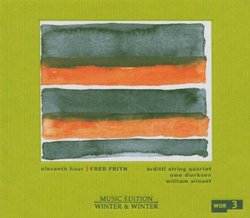An uneven set of Frith compositions (mainly) for string quar
R. Hutchinson | a world ruled by fossil fuels and fossil minds | 07/08/2005
(3 out of 5 stars)
"ELEVENTH HOUR is a very stylish package from the German Winter & Winter label, with cover art by Ursula Eichinger and eight more of her paintings in the booklet, all the same design but in different colors. Unfortunately, the music inside is of mixed quality. There are five pieces in all. Two of them are quite good ("Tense Serenity" and "Allegory"), one is good ("Lelekovice"), and two are not good ("Fell" and "Stick Figures"). Amazingly, the main musicians are the Arditti Quartet, you can't get any better than that!, but this is not among the best music they have ever performed.
Fred Frith, originally of Yorkshire, who began a long multifarious musical career with the British progressive rock group Henry the Cow in the late 1960s, has lately turned toward contemporary classical. Now a professor of composition at Mills College in the Bay Area, he spent the '80s in NYC's "downtown" scene with John Zorn and others, and the '90s in Germany where he connected with the W&W label, the AQ, composer Heiner Goebbels, and others.
The first piece "Lelekovice" (1990), in nine short movements, was written to accompany a dance. It's quite lively, in an Eastern European folk music mode -- Bartok of course springs to mind, though there is nothing in it nearly as thorny as his most complex quartets. "Tense Serenity" (1997), in five movements, is for string trio and trombone -- Uwe Dierksen plays trombone, and Graeme Jennings of Arditti sits out. The central movement features AMM/Keith Rowe-style radio fragments of songs and speakers, as well as what sounds like a flute, apparently produced by the strings. "Allegory" (2001), in three movements, is for string quartet and electric guitar. Frith's guitar is very subtly employed, and for much of the piece he is either silent or nearly so. Fair warning for those looking for flashy guitar pyrotechnics! These two pieces show what Frith can do, and though neither reveals a strong voice or unique style, they are fine examples of the European postserialist sonic landscape.
The two pieces that fill the rest of the second disc I consider outright failures. "Stick Figures" (1990) is for "6 guitars and 2 players," but all I can hear is two guitars -- one scrapes on the strings in what might be a simplistic parody of the experimental explorations of Hans Reichel, AMM's Keith Rowe and Frith, while another guitar regularly chimes a loud chord that sounds like a fragment of a Morricone soundtrack to a Sergio Leone western. "Fell" (2001), for string quartet and electric guitar, is also very simplistic, a descending series of chords for the strings, with periodic anguished squawks from the guitar. It seems to symbolize a soul's fall into Hell, or any number of more concrete and specific cases of flesh-and-blood humans falling into pain, death and despair.
ELEVENTH HOUR could have been a solid 4-star disc if "Allegory" had been included with "Lelekovice" and "Tense Serenity" on one disc, which would only be slightly over 70' long. I am certainly glad that Frith perseveres in creating adventurous music that is difficult to categorize, but I wonder if there might not be too much concept and too little music in more than just this one Frith project.
I know from interviews that Fred Frith shares my worldview (more or less), but I still have to guess at what the title means -- it seems clear to me that humans on Earth are in "the Eleventh Hour" in that we face an environmental crisis, and we may well still destroy ourselves if we don't develop more advanced and cooperative social institutions. (See my OVERSHOOT AND COLLAPSE? list.) In the meantime, I'm glad that Frith and I have both entered the world of contemporary classical music."


 Track Listings (14) - Disc #1
Track Listings (14) - Disc #1